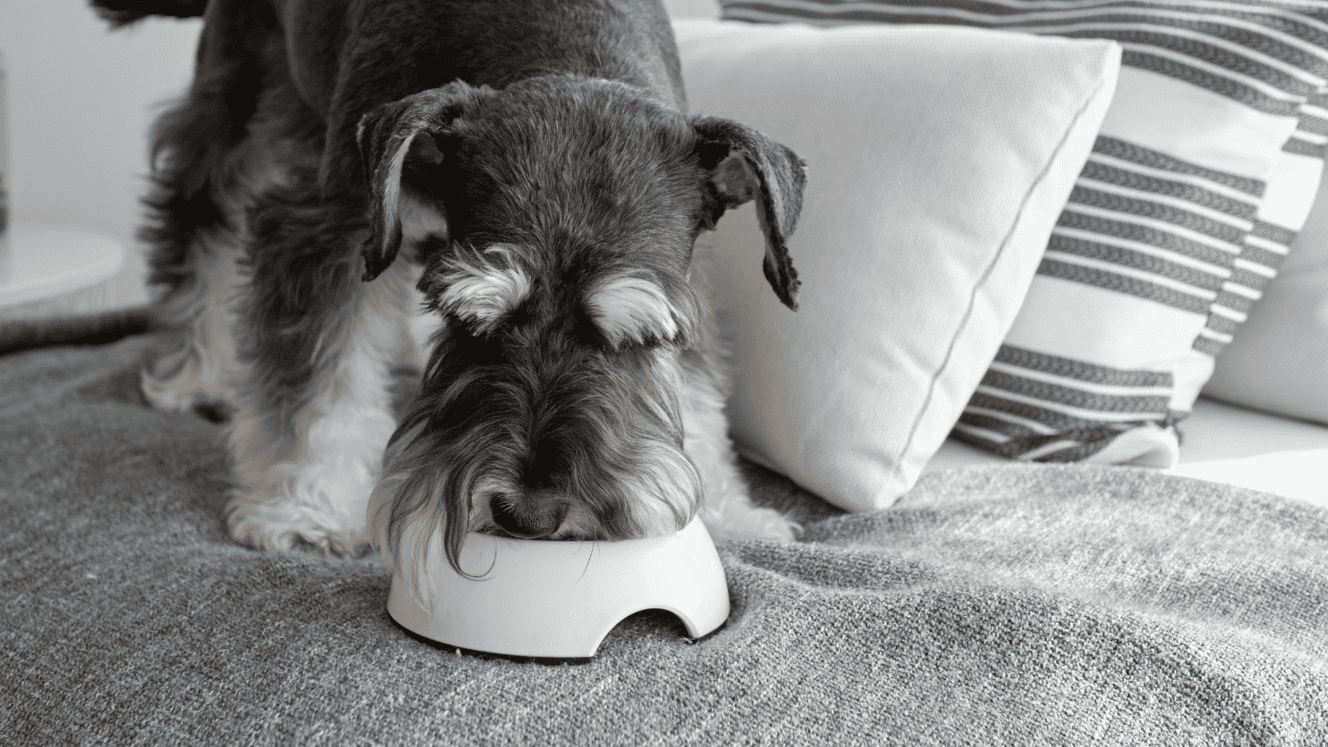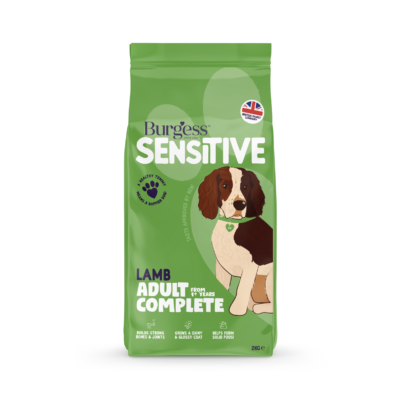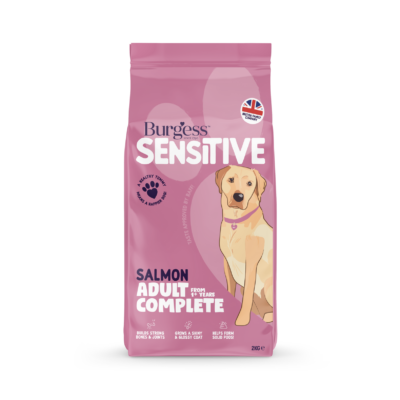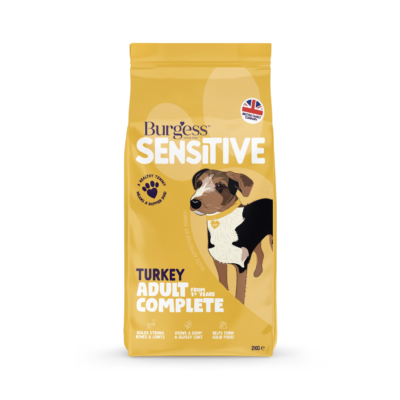
Adaptable and family-friendly, it’s no wonder that the mischievous Mini Schnauzer is such a popular breed. Petplan observes: “There’s never a dull moment with the fun-loving Miniature Schnauzer,” which is something that every Mini Schnauzer owner will wholeheartedly agree with!
A key part in caring for your Mini Schnauzer is feeding them the right nutrition. Choosing the most suitable dog food for Miniature Schnauzers is particularly important when you consider some of the health issues that can affect this energetic, playful breed.
Do Miniature Schnauzers need a special diet?
Mini Schnauzers can suffer from sensitive stomachs and skin issues, which may be affected by what they eat. That’s why it pays to look for the best Mini Schnauzer dog food that's easier on their digestion.
Petplan advises: “Like all breeds, Miniature Schnauzers are prone to certain conditions, and choosing a reputable breeder or rehoming organisation should be the first step to having a happy and healthy dog.”
Mini Schnauzers and digestive problems
The pet insurer highlights pancreatitis as a potential problem: “Miniature Schnauzers can be prone to a condition called pancreatitis, which means ‘inflammation of the pancreas’. It occurs when the digestive enzymes within the pancreas start attacking it and there are mild and severe forms. Treatment for the mild form revolves around supportive care and avoiding highly fatty foods.”
Burgess in-house vet, Dr Suzanne Moyes MVB MRCVS, who oversees recipe development and product production, advises: “Dogs with a delicate digestion or who may be prone to allergies can benefit from hypoallergenic dog food that’s made without many of the typical ingredients known to cause upset tummies or skin problems. These ingredients can include beef, eggs, dairy, wheat, maize, and soya. For many dogs with digestive or skin issues, switching to a sensitive dog food (which means it’s relatively unlikely to cause an intolerant reaction) can be really helpful, although you should always ask your vet for advice.”
TOP TIP!
Is your Mini Schnauzer always hungry? You may need to switch up their nutrition. Petplan suggests: “An easy fix solution could be that the food itself is not giving the dog enough nutrients and it is constantly feeling hungry. By switching the food you are feeding them to something more nutritionally beneficial you may be able to change your pet’s eating behaviour.”
Mini Schnauzers and teeth issues
Miniature Schnauzers can also be susceptible to teeth problems. According to a recent study carried out by the Royal Veterinary College, the most common disorder affecting the breed is dental disease (affecting 17.4% of Miniature Schnauzers).
Petplan explains: “Miniature Schnauzers are prone to developing dental and mouth issues. Because of their smaller mouths they are more likely to have overcrowding, and food, bacteria and minerals can accumulate on the gum line. This causes a build up of 'tartar' which eventually affects the gum causing 'gingivitis', this means small spaces between the gum and teeth are formed where bacteria grow and results in periodontal disease. This can be serious as the bacteria from infected gums can spread around the body and damage the liver and kidneys. This condition can be prevented with regular dental descales and at home tooth brushing.”
The food you choose for your Mini Schnauzer can also make a difference. The RSPCA states: “Some owners favour wet foods for their dog over dry. However, dry dog food may have the added benefit of exercising their chewing muscles and provide a mild cleaning effect on the teeth.”
TOP TIP!
Did you know that there are lots of benefits to feeding dry food for dogs? The thorough cooking process ensures that any harmful bacteria, such as salmonella, and viruses are destroyed, and the kibble stays fresh inside the pack until you’re ready to serve it. Plus, by following the on-pack instructions, it’s easy to measure out exactly the right sized portion, to ensure your Miniature Schnauzer maintains a healthy weight.
Feeding puppies, adults and seniors – how do a Miniature Schnauzer’s nutrition needs change throughout their life?
Whatever age your Miniature Schnauzer is, when it comes to feeding any dog, the healthiest dog food should provide the correct number of calories, dietary components and balance of nutrients for a dog’s size, life stage and lifestyle.
A good dog food for Miniature Schnauzers will contain the correct balance of easily digestible protein, fat, carbohydrate, and a little bit of fibre to help maintain a healthy gut. It should also include vitamins and minerals such as zinc, to support skin and coat health, and calcium to support healthy teeth and bones. Your dog should get everything they need from their food.
Essential nutrients for dogs
Pet food industry body, UK Pet Food, says: “There are 37 essential nutrients that dogs must eat in their food. Prepared complete dog foods are formulated to provide all of these in the right amounts and proportions. Manufacturers take great care to ensure that the end result is appealing to dogs, so you can be confident your canine friend is enjoying their well-balanced diet!”
High quality dog food that meets the changing needs of puppies, adult and seniors
What’s more, because a dog’s nutritional needs vary throughout their life, their food can play a significant role in helping them stay healthy and happy when it’s tailored to the different stages of a their development.
The best dog food for Mini Schnauzers will support the optimum quality of life, from puppyhood to adult and throughout their senior years.
- Puppies (up to when they’re 12 months old) require a little more protein to support their growing muscles. Food for puppies should also contain the right balance of calcium and phosphorus for developing bones and teeth. Best dog food for Miniature Schnauzer puppies >>
- Adult dogs (from one year) require foods that are naturally rich in protein for good muscle maintenance and essential fatty acids to help nourish their coat. Best dog food for adult Miniature Schnauzers >>
- Senior dogs (age seven onwards) benefit from added glucosamine for optimal joint mobility. Best dog food for senior Miniature Schnauzers >>
Searching for the best dog food for a Mini Schnauzer? Check out what our customers have to say...
***** With a whole host of five-star reviews, here’s a snapshot of what happy customers have told us about our Burgess Sensitive Dog Food range:
“Seems to have calmed pup's tummy and he eats every kibble and is excited at every mealtime.”
“Works well for my puppy and has made a great difference to his digestive system.”
“Dogs with sensitive stomachs love it. Really suits them and helps their digestive system.”
“Puppies seem to thrive on product.”
“My dogs love this food and it’s great for their skin.”
“Great puppy food, our dog loves it and it’s a reasonable price. The weekly/monthly subscription service is great too.”
“My dogs love it and have beautiful shiny coats.”
“Both dogs are really healthy and love the food.”
“Super quick delivery, large bags of food for a brilliant price!”
“Dog loves it and I’m saving money.”
“My dog enjoys it and it's settled his sensitive stomach. We tried various diets, and this was the only one that settled him.”
What food should I not feed my Miniature Schnauzer?
As a rule of thumb, it’s best to avoid feeding human food, such as scraps left over from your own dinner. Instead, feed your Mini Schnauzer with dog food that’s designed just for them.
Human food doesn’t contain all the essential nutrients in the right amounts that dogs need. What’s more, there are many common foods that are extremely dangerous for dogs, such as gravy, fat trimmings, and the artificial sweetener Xylitol, which sneaks its way into all sorts of foods – from peanut butter to jellies and jams.
If you suspect your Mini Schnauzer has eaten any of the following, consult your vet immediately.
- Alcoholic beverages
Can cause intoxication, coma, and death. - Chocolate, coffee, tea
Contain caffeine, theobromine, or theophylline, which can be toxic and affect the heart and nervous system. - Fat trimmings
Can cause pancreatitis. - Pits from peaches and plums
Can cause obstruction of the digestive tract. - Grapes and raisins
Contain an unknown toxin, which can damage the kidneys. - Gravy
If made from meat juices, it can contain high levels of fat, which can cause pancreatitis. - Large amounts of liver
Can cause Vitamin A toxicity, which affects muscles and bones. - Macadamia nuts
Contain an unknown toxin, which can affect the digestive and nervous systems and muscle. - Milk and other dairy products
Some adult dogs do not have sufficient amounts of the enzyme lactase, which breaks down the lactose in milk. This can result in diarrhoea. - Meat-free options
Products such as Quorn may contain onion and garlic, so it’s best to avoid giving them to your pets.
- Mouldy or spoiled food
Can contain multiple toxins causing vomiting and diarrhoea and can also affect other organs. - Mushrooms
Can contain toxins, which may affect multiple systems in the body, cause shock, and result in death. - Onions and garlic (raw, cooked, or powder)
Contain sulfoxides and disulfides, which can damage red blood cells and cause anaemia. Garlic is less toxic than onions. - Potato, rhubarb, and tomato leaves; potato and tomato stems
Contain oxalates, which can affect the digestive, nervous, and urinary systems. This is more of a problem in livestock. - Raw eggs
Contain an enzyme called avidin, which decreases the absorption of biotin (a B vitamin). This can lead to skin and hair coat problems. Raw eggs may also contain salmonella. - Raw fish
Can result in a thiamine (a B vitamin) deficiency leading to loss of appetite, seizures, and in severe cases, death. More common if raw fish is fed regularly. - Excessive salt
If eaten in large quantities, it may lead to electrolyte imbalances. - Sugary foods
Can lead to obesity, dental problems, and possibly diabetes mellitus. - Table scraps (in large amounts)
Table scraps are not nutritionally balanced and if excessively fed can lead to obesity. Fat should be trimmed from meat; bones should not be fed. - Xylitol
This artificial sweetener is highly toxic to canines. After a dog consumes a significant amount of Xylitol, there is a massive release of insulin from the pancreas. This, in turn, results in a dangerously low blood sugar level and symptoms such as weakness, trembling, seizures, collapse, and even death.
Good to know
- Burgess Pet Care is committed to making safe, high quality dog food for canines of all ages. All our dog foods are made at our own factory in the heart of Yorkshire, using only ingredients that meet our stringent specifications – locally sourced wherever possible to support British farmers.
- All the foods in the Burgess Sensitive Dog Food range for puppies, adults and senior dogs are complete. This means that you can be sure you are providing your pet with all the nutrients they require in exactly the right proportions, so you don’t have to worry about balancing their diet.
- The recipes feature the nutrients that your dog needs to lead a happy and healthy life without an upset tummy or runny poos.
Need more advice?
If you’re at all unsure about the best way of feeding your dog or have any concerns about specific nutritional requirements, ask your local veterinary practice for advice. You can also call our expert team, available 9am-5pm, Monday to Friday, on +44 (0)1405 862241 who’ll be happy to help. Alternatively, use our online contact form to get in touch.
Is your dog a Burgess dog? Join the Burgess Pet Club for exclusive offers and rewards.
CARE MORE Find out more about caring for your dog from Burgess, the pet experts. Training, nutrition, grooming and general care. It's all here
If you found this interesting, you may also like:
DOG DAYS From puppy to adolescent, through to adult and senior, as your dog goes through different stages, their exercise and nutrition needs change. Find out how to help them stay happy and healthy every day of their lives...
COULD YOUR DOG BE ALLERGIC TO YOUR HOUSE? Our four-legged friends can be allergic to all sorts of things, from chemicals in cleaning products to pollen, dust, fleas and even smoke from cooking.
DOGS EAT GRASS – BUT WHY? While there are all sorts of theories as to why they do it – from fulfilling their natural omnivore instinct to improving digestion or simply because they enjoy the interesting taste and texture – no one’s exactly sure why.
DID YOU KNOW THAT OUR PETS CAN SUFFER FROM HAY FEVER TOO? While the cause of pollen allergy is the same in pets as it is in humans, the signs that your pet is suffering from hay fever can be a little different.
FOOD ALLERGIES UNDER INVESTIGATION Itchy skin, upset tummy, weight loss? These can all be symptoms caused by diet – although there could be many other reasons why your pet is out of sorts, and you should always ask your vet for advice. But if you suspect food could be the issue, where do you start?
ZOOMIES EXPLAINED Running around in circles? Mad, mid-air twists and spins? When your pet shows a flash of exuberant activity, what does it mean?
A PET BY ANY OTHER NAME Want just YOUR dog to come when you call them? When it comes to the pet naming game, choose wisely...
OPEN UP YOUR EYES TO YOUR DOG’S WORLD Understanding how your four-pawed pal interprets the world through their five senses can help you provide them with the best, most enriching life.
PROTECT YOUR PET’S HEALTH DURING THE COST-OF-LIVING CRISIS There’s no doubt that this can be especially challenging during the current cost-of-living crisis. However, there’s lots you can do – and help is available for people and pets most in need.
PET INSURANCE EXPLAINED Cat insurance, dog insurance, rabbit insurance – what pets can get cover? Can you get pet insurance for pre-existing conditions? Can you get pet insurance for older pets? Can you get multi-pet cover? We answer some of the most commonly asked questions to help you make an informed decision about pet insurance.
FAD DIETS – SHOULD DOG OWNERS BE WORRIED? Raw, grain free or home-cooked? The range of options for feeding your dog seems to be ever expanding, with owners willingly trying out new foods for their canine companions. But what do animal nutrition experts have to say about it?
VEGAN DIETS AND PETS – GETTING THE FACTS STRAIGHT Burgess in-house vet Dr Suzanne Moyes, comments: “Our pets deserve the correct nutrition to thrive and it’s vital that we respect our pets’ natural diet and feed them food that is nutritious, well-balanced and as close as possible to what they would eat in the wild, whether they’re natural carnivores, omnivores or vegetarians.”
ARE YOU READY FOR A DOG? Taking on a dog is a huge decision. It requires money, time and commitment. Here are some of the things you’ll need to consider...

















